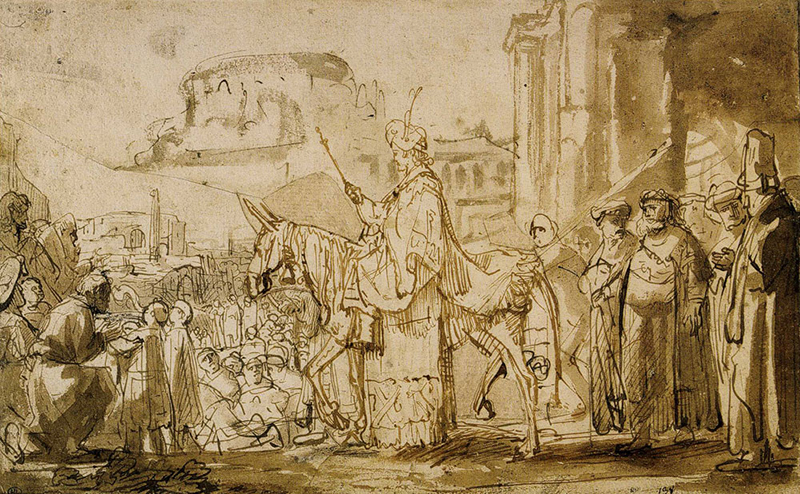Words of Wisdom
The Legacy of King Solomon
Solomon, known throughout the ancient world for his unequalled wisdom, left behind a treasury that includes poetry, timeless proverbs and deep personal reflections.
READ PREVIOUS
(PART 33)
GO TO SERIES
Three books within the Writings section of the Hebrew Scriptures are associated with Solomon, third king of Israel, in various stages of his life. They could be said to range from youthful love poetry (Song of Songs) to collected wise sayings of middle age (Proverbs) to the account of a late-life struggle with disillusion (Ecclesiastes). In each case the books contain ages-old wisdom still valuable for our times.
Here we will discuss the first two books. While there is uncertainty among scholars about the precise dates of their initial composition and also about the extent of Solomon’s authorship, this has not curbed the popularity of at least two of them: Song of Songs, with well over a hundred commentaries devoted to it, and Proverbs, which alongside Genesis and Psalms is one of the Old Testament’s most read books.
Attempts to understand the Song (literally “The Song of Songs which is to Solomon”) have varied greatly over the centuries, from a straight-ahead reading of the book as expressing the delights of physical male-female sexual love, to complex historical or mystical allegories of Yahweh and Israel and of Christ and the Church. Other interpretations have suggested that the book is a drama, a parable, a love poem or a love song.
A contemporary view recognizes the connection between God and His physical creation, without straining for spiritual meaning in the text. That’s to say, the collection of a possible 14 scenes of youthful sexual attraction, lovesickness and marital joy is consistent with the revelation of Yahweh as creator of human life. Solomon is named at various junctures as a reference point for the young lovers rather than as an actor. We read about “the curtains of Solomon,” “Solomon’s couch,” “Solomon the King” and “King Solomon with the crown,” and that “Solomon had a vineyard”; we also hear him addressed, “You, O Solomon” (1:5; 3:7, 9, 11; 8:11, 12). It may be that as collector of these love poems, the king authorized their publication and that this is why his name is attached to the book.
Of the origin of the book of Proverbs we know more. In one of Israel’s histories, we are told that Solomon “composed three thousand proverbs, and his songs numbered a thousand and five.” Though Proverbs lists many sayings by Solomon and several other “wise men,” even together they number far less than three thousand. But we learn that “God gave Solomon very great wisdom, discernment, and breadth of understanding as vast as the sand on the seashore, so that Solomon’s wisdom surpassed the wisdom of all the people of the east, and all the wisdom of Egypt” (1 Kings 4:29–32, New Revised Standard Version). The Tanakh translates “the people of the east” as “the Kedemites,” from the Hebrew qedem, “east.” This could mean the Mesopotamians, who along with the Egyptians were known in the ancient world for their extensive knowledge.
Solomon’s knowledge was seemingly encyclopedic, his wisdom much sought after: “He would speak of trees, from the cedar that is in the Lebanon to the hyssop that grows in the wall; he would speak of animals, and birds, and reptiles, and fish. People came from all the nations to hear the wisdom of Solomon; they came from all the kings of the earth who had heard of his wisdom” (verses 33–34, NRSV). These visits included the famous one by the Queen of Sheba, mentioned later by Jesus Christ, a descendant of Solomon (see 1 Kings 10; Matthew 12:42; 1:1, 6–7).
“The description of the wise king in 1 Kings . . . provides a definition of wisdom in which politics and prophecy, intellect and piety, the secular and the sacred intersect.”
Sage Words
Proverbs opens with a detailed statement of purpose: “The proverbs of Solomon the son of David, king of Israel: To know wisdom [in Hebrew, hakmah] and instruction, to perceive the words of understanding, to receive the instruction of wisdom, justice, judgment, and equity; to give prudence to the simple, to the young man knowledge [da’ath] and discretion—A wise man will hear and increase learning, and a man of understanding will attain wise counsel, to understand a proverb and an enigma, the words of the wise and their riddles” (Proverbs 1:1–6).
The author adds that respect or reverence for God is the only way to the kind of knowledge that leads to wisdom: “The fear [yirah] of the Lord is the beginning of knowledge [da’ath], but fools despise wisdom [hakmah] and instruction” (verse 7). The opening nine chapters conclude with a related statement: “The fear [yirah] of the Lord is the beginning of wisdom [hakmah], and the knowledge [da’ath] of the Holy One is understanding” (9:10).

Young Solomon Proclaimed King, Riding on the Mule by Rembrandt Harmenszoon van Rijn, pen and wash in bister (ca. 1637)
Though the book references many wise sayings taken from the secular world around, foundational to gaining spiritual wisdom is a relationship with God based on respect for Him. Only a fool would approach the pursuit of wisdom in any other way.
The structure of the nine introductory chapters (1:8–9:18) follows the pattern of father, mother and son in an instructional setting, promoting wise behavior over foolishness. “My son, hear the instruction of your father, and do not forsake the law of your mother” (1:8). “My son” is addressed many more times (1:10, 15; 2:1; 3:1, 11, 21; 4:10, 20; 6:1, 3, 20; 7:1), as direction is given to avoid the sins of laziness, deceit and promoting discord; and to avoid the company of sinners of various stripes: murderers, thieves, immoral women, oppressors, the scornful, adulterers.
But it’s clear that the antidote for such behavior comes from only one source: “For the Lord gives wisdom; from His mouth come knowledge and understanding” (2:6). Learning to rely on Him rather than on self-generated knowledge will bring great reward to the young: “Trust in the Lord with all your heart, and lean not on your own understanding; in all your ways acknowledge Him, and He shall direct your paths” (3:5–6).
“At its foundation, Proverbs describes wisdom as a relationship; it begins with the ‘fear of the Lord’ (Proverbs 1:7).”
The Way of Wisdom
Only at the beginning of chapter 10 are we introduced to “the proverbs of Solomon.” They continue through chapter 22:16. Again the emphasis is on instructing young people in the way of wisdom: “A wise son makes a glad father, but a foolish son is the grief of his mother” (10:1).
This is followed by advice including the right way to live and to raise children; the way of hard work, honest gain and diligence; and discretion and generosity in the context of wise/foolish, right/wrong, just/wicked behavior: “The integrity of the upright will guide them, but the perversity of the unfaithful will destroy them” (11:3).
These distinctions continue steadily into chapter 15. The use of the tongue to promote good or evil is emphasized, along with God’s blessings for right versus retribution for wrong. Doing what is right benefits personally, interpersonally and collectively, whereas doing what is wrong destroys on all levels. This simple equation plays out in everyone’s life—for men and women; in physical and mental health; in friendships, marriages and families; in cities and nations: “Righteousness exalts a nation, but sin is a reproach to any people” (14:34). The human mind can easily deceive itself, but God-based wisdom can always resolve the impasse.
Chapter 15 emphasizes several sayings about Yahweh (“the Lord”) in quick succession, preparing the reader for the next chapter, where 16 “Yahweh” sayings follow. For example, “The eyes of the Lord are in every place, keeping watch on the evil and the good” and “The Lord is far from the wicked, but He hears the prayer of the righteous” (15:3, 29). Fifty-eight such examples in the proverbs are attributed directly to Solomon (10:1–22:16 and 25:1–29:27).
The next section (16:1–22:16) begins with further mention of God’s sovereignty and His blessing on those who follow His way (verses 1–9). Six more verses link the successful king with submission to God’s rule. The center of the book is verse 17, which emphasizes once more the importance of following God’s way of wisdom: “The highway of the upright is to depart from evil; He who keeps his way preserves his soul” (16:17).
Themes that recur from this point to the end of this first Solomonic section include the well-known danger of pride (“Pride goes before destruction, and a haughty spirit before a fall” [16:18]) and the importance of humility; deceit, violence, a divisive spirit, laziness, anger and the value of self-control; raising children to follow the right path; the sorrow and disappointment caused to parents by foolish adult children; and human thinking versus godly principles (“The human mind may devise many plans, but it is the purpose of the Lord that will be established” [19:21, NRSV]).
“For the most part, the concern of the book [of Proverbs] is to convey the fundamentals of morality, the virtues of integrity, discipline, justice, common sense, and the like, and to show by way of contrast the failure in life that awaits the fool.”
Two sections that follow (22:17–24:22 and 24:23–34) are marked as extra sayings collected from wise men other than Solomon. They enunciate many similar principles. Next are additional “proverbs of Solomon which the men of Hezekiah king of Judah copied” (25:1–29:27). It’s uncertain what these scribes did beyond copying proverbs attributed to Solomon more than 200 years after his death. But here are familiar reminders about humility, kindness and neighborliness; about mercy toward enemies (“If your enemy is hungry, give him bread to eat; and if he is thirsty, give him water to drink,” [25:21]); the mind of a fool; and the dangers of talebearing and plotting evil (“Whoever digs a pit will fall into it, and he who rolls a stone will have it roll back on him” [26:27]).
Solomon by Another Name?
The final two chapters of Proverbs are each divided into two sections. First are “the words of Agur the son of Jakeh, his utterance” (30:1–14), followed by a series of observations of things in nature and in human relationships organized into numerical sets (verses 15–33). The identity of Agur is unknown, as is Jakeh. The word utterance can also be translated as a place name, Massa, making Agur possibly a native of northern Arabia and a descendant of Ishmael, son of Abraham.
Some scholars speculate that Agur is Solomon by another name, but verse 3 is not consistent with this idea: “I neither learned wisdom nor have knowledge of the Holy One.” This admission leads to a series of questions (verse 4) reminiscent of Job’s encounter with God when he was brought face-to-face with his own inadequacy (Job 38–42). Agur has to recognize that he is no match for God’s wisdom and that “every word of God is pure” (verse 5). It may be that Agur knew of Israel’s God and wrote accordingly, asking for mercy and consideration: “Remove falsehood and lies far from me; give me neither poverty nor riches” (verse 8). He concludes with reminders not to dishonor parents, not to be hypocritical or haughty, nor to neglect the less fortunate.
The final chapter of Proverbs is introduced as “the words of King Lemuel, the utterance (in Hebrew, massa) which his mother taught him.” Once again we have an unknown author, possibly from the same region as Agur. And again, without reliable evidence, speculation has made Lemuel a pseudonym for Solomon, and these the wise words of his mother, who warns that he should avoid giving his strength to women or himself to alcohol. Inability to judge in favor of the less fortunate could be the result. Rather give strong drink to the distressed, who may derive some temporary benefit from it. So much the better, though, if the advice is not specific to the king but is intended as wisdom for all in positions of authority.
The final section of the chapter (verses 10–31) is organized as an alphabetic acrostic, each verse beginning with a sequential letter of the Hebrew alphabet. The passage is given over to the well-known description of the ideal wife. As the conclusion to the book, these verses may well epitomize the female personification of wisdom first mentioned in chapter 8. The woman described here is certainly beyond perfect in her ability to organize, maintain and provide for her household. Yet many a husband and family has seen these characteristics in their wife and mother and are grateful for them. Like wisdom’s children, they “call her blessed,” just as her husband “praises her” (verse 28).
The third book attributed to Solomon is Ecclesiastes, a very different one in mood to any other in the Bible. We’ll turn there next time.
READ NEXT
(PART 35)


